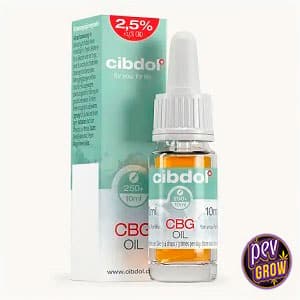- Exhaustive comparison between CBG and CBD, analyzing their differences, effects, and therapeutic benefits. Discover which might be better in each case and make an informed choice.
- How to consume CBD oil for pain relief
- Panakeia: A strain rich in CBG and THC-free


In constant struggle for the regulation of cannabis, mainly in the medicinal field.
07-05-2024 07:00:00 - Updated: 7 May, 2024
In the emerging field of medicinal cannabis, cannabinoids such as CBG (cannabigerol) and CBD (cannabidiol) stand out for their unique properties and therapeutic applications. This article delves into the differences and similarities between them, exploring how their combined use can enhance their effects and provide greater health benefits. From their interaction with the endocannabinoid system to their specific clinical applications, discover everything you need to know about the differences between CBG and CBD.
📖 What is CBG vs CBD?
The confusion between CBG and CBD is common among consumers and patients seeking alternative cannabis therapies. This confusion arises not only from their similar names but also from their complex interactions within the human body. Both are non-psychoactive cannabinoids derived from the cannabis plant, but their effects on the body and mind can vary significantly, making it crucial to understand their particulars before considering their use.
✅ Benefits of CBD and CBG
- Enhancing pain relief: CBG’s anti-inflammatory action complements CBD’s analgesic effects.
- Improving anxiety and stress management: CBD is known for its anxiolytic properties, while CBG can add a more balanced effect to the central nervous system.
- Optimizing anti-inflammatory and antibacterial properties: CBG has antibacterial and anti-inflammatory potential, which together with CBD offers a broader spectrum of action against infections and inflammatory ailments.
🔥 Effects of CBG and CBD
When administered together, CBG and CBD can offer a wider range of therapeutic effects:
- Neuroprotection: Both cannabinoids have neuroprotective properties, which can be particularly useful in neurodegenerative diseases such as Alzheimer’s and Parkinson’s.
- Eye health: CBG has been shown to be effective in reducing intraocular pressure, a major concern in patients with glaucoma, while CBD contributes to the overall well-being of the optic nerve. The CBG and CBD oil is especially useful in this case.

🎯 Side Effects of CBD and CBG Together
- Gastrointestinal discomfort: Such as nausea or changes in appetite.
- Tiredness and fatigue: Particularly if consumed in high doses during the day.
- Interactions with other medications: It is crucial to consult with a healthcare professional before starting a regimen that includes these cannabinoids.
👾 Comparative table between CBG and CBD
| Feature | CBG (Cannabigerol) | CBD (Cannabidiol) |
|---|---|---|
| Origin in the Plant | Precursor to other cannabinoids; less abundant in the plant. | Present in larger amounts in the cannabis plant. |
| Interaction with the Endocannabinoid System | Binds directly to CB1 and CB2 receptors. | Has a low affinity for CB1 and CB2 receptors, interacts mainly through other channels. |
| Therapeutic Effects | Antibacterial, neuroprotective, and anti-inflammatory potential. Beneficial for treating glaucoma and digestive issues. | Known for its anti-inflammatory, analgesic, and anxiolytic effects. Useful in treating anxiety, depression, and certain inflammatory conditions. |
| Common Side Effects | Little studied, but considered safe. May include gastrointestinal discomfort or fatigue at high doses. | Generally well-tolerated; possible effects include fatigue, changes in appetite, or gastrointestinal discomfort. |
| Recommended Use | Less common in products due to its scarcity and high production cost. Researched for specific applications. | Widely used in a variety of products, including oils, capsules, and creams, due to its abundance and lower cost. |
🧐 Conclusions
CBG and CBD are two powerful cannabinoids with significant therapeutic potential. While CBG is effective as a neuroprotector and in treating eye conditions, CBD is widely recognized for its ability to relieve pain, anxiety, and inflammation. Together, they offer a complementary approach in treating various conditions, leveraging the entourage effect to maximize their benefits. Consider these differences and similarities when choosing the most appropriate treatment for your needs, always under the supervision of a healthcare professional. Now that you have a clear understanding of the differences between CBG and CBD, you might also want to check out this other article that discusses the differences between CBC and CBD, so you can better choose your treatment.
⚠️ FAQS
- Is CBG stronger than CBD? Not necessarily stronger; both have unique and complementary profiles that may be more effective together depending on the condition treated.
- Is CBD or CBG better for anxiety? CBD has been proven to be more effective for anxiety due to its extensive study and application, but CBG may amplify some of its effects.
- Can you take CBD and CBG together? Yes, taking them together is safe and can be beneficial for a variety of conditions due to the entourage effect.
- Do CBD and CBG show up on drug tests? Generally not, as standard tests look for THC, the psychoactive compound in cannabis.






Awesome article, guys! Now I really get the difference between CBG and CBD, you guys went above and beyond!